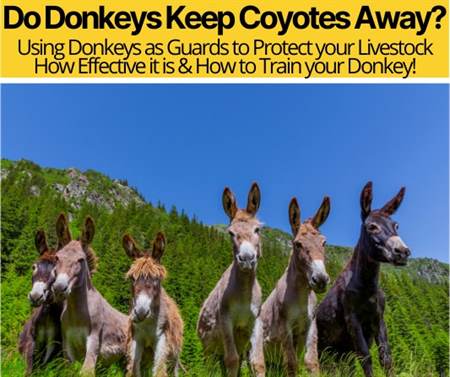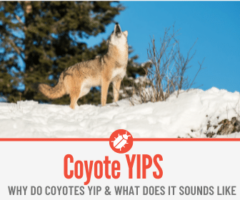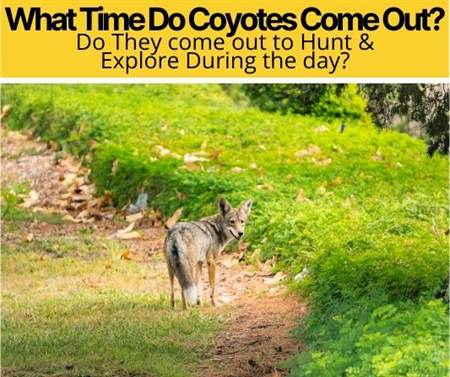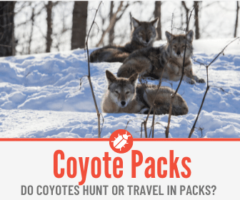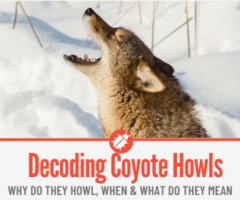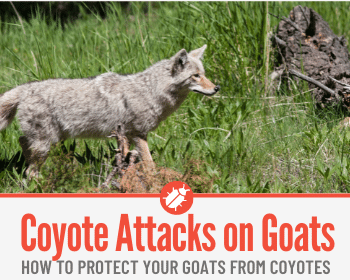 Wondering If Coyotes are known to Attack and Eat Goats? Is there anything you Can do to Protect your Goats from Coyotes?
Wondering If Coyotes are known to Attack and Eat Goats? Is there anything you Can do to Protect your Goats from Coyotes?
In this guide you will learn:
- If Coyotes are Known to Attack Goats,
- Can Goats Defend themselves from being eaten by a Coyote,
- How to Protect your Goats from Coyotes,
- Which are the best Coyote Proof Goat Fences / Enclosures
Goat owners, beware, No Goat is Safe from Coyote Attacks!
Coyotes are growing in number across the United States — yes they will attack your goat herd.
Coyotes will attack and eat any breed of goats from the smallest Pygmy goats to the largest Boer goats and everything in between.
Coyotes hunt late at night or early in the morning, and usually attack the throat of the goat first.
Eastern coyotes hunt goats individually, while western coyotes hunt goats in packs.
They are efficient hunters and kill one goat at a time, as opposed to feral dogs which injure large quantities of goats.
Do Coyotes Eat Goats?
Yes; unlike feral dogs which attack whole goat herds for sport, coyotes attack goats to feed themselves.
Coyote attacks tend to increase in spring and summer, when coyotes’ diet shifts from primarily fiber to primarily protein.
After killing the goat with a swift bite to the throat, coyotes will eat and clean out the abdominal cavity and leave nothing but hide and bones.
Coyotes can even eat young kid goats in their entirety.
Sometimes coyotes will drag a goat away to eat it in private. Although coyotes may kill more than one animal at a time, they often only feed on one.
Can Goats Defend themselves Against Coyotes?
Goats are more aggressive with each other than sheep. However, this type of head-butting does little to ward off predators.
A goats’ first instinct is to run. Backed into a corner they will fight a predator such as a coyote, but despite their size they are not talented fighters.
A goat’s best defense is climbing to where the predator cannot reach them. Unfortunately, coyotes are also skilled climbers as well as faster than goats.
Goats have little protection against coyotes attacking them.
More to read: Did you know that people nowadays have started to Domesticate coyotes and that there are Pet Coyotes?
How do I Protect my Goats from Coyotes
With coyotes on the prowl everywhere, goat owners should take careful precautions. We will evaluate some of the common methods of keeping coyotes away from eating your goats.
Dogs are a Valuable farm Resource to Protect Goats from Coyotes.
But not any dog will get the job done, and choosing the right breed is critical. Farm dogs need both the correct instincts and the correct training to keep your farm safe.
A goat guard dog should be large enough to intimidate predators and have sharp protective instincts.
Great Pyrenees Mountain dogs are the most popular choice. Bred in the Basque Country of Spain, they are large and love open spaces.
Anatolian Shepherds and Maremma Sheepdogs are other good guard dogs. Like Great Pyrenees, they have natural protective instincts.
A true guard dog will not be a typical family pet. Guard dogs should grow up with the goats in order to develop a bond.
Puppy years are critical. Farm dogs such as Great Pyrenees are sociable with humans, but too much human coddling can dull a dog’s protective instincts.
Can a Donkey Protect Goats from Coyotes?
Donkeys make surprisingly good goat guardians. These shaggy creatures will bray loudly to discourage predators.
They have good eyesight in the dark, which is essential for any night watch animal. They also attack if they feel threatened, biting and kicking.
Mules also make good guard animals and are larger than donkeys.
Horses, on the other hand, will run at any suggestion of danger and will not protect any animals.
Like guard dogs, donkeys should grow up with the goats they will protect. They should not spend much time around domestic dogs or they will get too comfortable around canines.
Gelded donkeys and jennies (female donkeys) make the best guard donkeys to protect your goats. Ungelded donkey males or “jacks” are aggressive and harder to handle.
When faced with an individual coyote, a donkey can usually kill it by stomping it to death.
However, by itself a donkey is no match for a coyote pack. More than one donkey is advisable to protect larger goat herds.
Miniature donkeys (under 36” at the withers) are too small to kill coyotes attacking your goats but they can help make noise to scare predators away.
A mix of miniature and larger donkeys would work well.
Read our Full Guide: How to use Donkeys to Keep Coyotes Away
Snares and Traps
Snares and Traps can help Fight against Coyote Attacks in the Absence of Guard animals.
While not a completely reliable solution by themselves, snares and traps can deter coyotes from your yard.
It is important to check state guidelines for snares and traps. Most states have detailed instructions on how to make sure the snare is safe.
In some states such as New Jersey, it is illegal to possess or use any steel-jawed leg-hold type trap.
Related: Do Coyotes Hunt in Packs
Flashing Lights & Loud Sounds
Coyotes will shy away from flashing lights and loud sounds. You can take advantage of this fact to protect your goats and stop Coyotes attacking them.
Predator deterrent lights are lights that mimic a predator’s eyes and take advantage of coyote’s instinctual fear.
More than one of these lights is advised because a coyote might take its chances against just one predator.
Red flashing lights have proven most effective in keeping coyotes away from yards. Steady lights such as porch lights are the least effective.
But lights may not create a long-term solution, as coyotes that are hungry enough might eventually overcome their fear.
More to read: Do Coyotes Hunt During the day
Hazing
Hazing is somewhat effective for keeping coyotes away.
Some owners train neighbouring coyotes to associate their property with fear using whistles, hoses, pepper spray and other devices.
One or two hazings will usually keep a coyote away for good from your goats.
But this process must be repeated with every individual coyote that finds the property. Therefore, it is not a complete long-term solution.
Coyote Proof Goat Pens/ Enclosures
A goat pen or enclosure is necessary for every goat owner. Building a successful goat pen that protects against predators involves some time and thought.
Coyotes can climb over solid fences up to 6 feet tall to attack your goats!
Because of this, solid fencing such as wood is not recommended.
Goat owners should also space fence openings at less than 4 inches so that the goat will not stick its head through the fence and get stuck.
Goats with horns pose an additional challenge.
There are 4 most common types of fencing which work to protect goats from coyote attacks.
- Livestock panels, or cattle panels, are made up of heavy wire fencing grids of 6” by 8” openings.
This type of fencing is sturdy and will withstand abuse. However, the gaps can be a little large for small kid goats.
- Hog wire works better than cattle panels for goats.
It is similar but uses 4” by 6” squares and provide less opportunity for goats to get stuck.
- Electric fencing is one of the most common types of goat fencing.
Electric fences are often used in combination with hog wire fences for maximum protection against coyotes.
Keep in mind that the voltage must be high enough for goats and predators such as coyotes to learn their lesson after one touch.
But it cannot be high enough to seriously injure or kill the goats.
- Chain link fencing is the best option to stop coyotes attacking and eating goats, but also the most expensive.
Chain link fencing is the sturdy woven fence made from galvanized or LLDPE-coated steel most commonly used around homes, business, and job sites.
This rigid fencing offers the best protection against Coyotes and will keep your goats in as well.
However, it is a permanent fencing and could cost thousands of dollars to set up!
What Else Makes for a Successful Goat Enclosure?
Not only do you want it to be coyote-proof, but you want it to be livable.
Goats need about 200-250 sq. ft. per goat in order to move comfortably. Keep in mind that if you decide to house guard donkeys with your goats, they will need additional space.
A good walk-in shelter with a sturdy roof will keep goats safe and dry in the elements. 20 sq ft per goat would offer more than enough room for this shelter.
A smaller shelter is acceptable because goats will huddle together for warmth anyway.
A few other necessary amenities are a hay feeder, a good source of fresh water, and bedding for the shelter.
Is there Anything else I should Know about Coyotes?
Some rules of thumb to follow are:
Never leave food outside which can attract coyotes.
Never tether goats outside. This is basically live bait for coyotes.
Keep your small pets inside.
Avoid large bird feeders, smelly garbage — anything that might attract a coyote’s attention.
If you see a coyote, act scary. Loud noises, flashing lights, etc.
In Conclusion
It’s absolutely possible to keep your goats healthy, happy, and safe from coyote attacks.
Just make sure to inform yourself and take all the necessary precautions before starting your goat farm.

